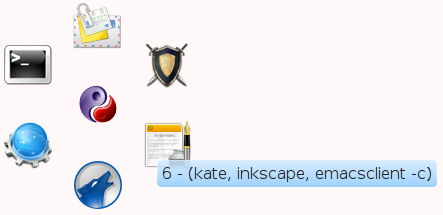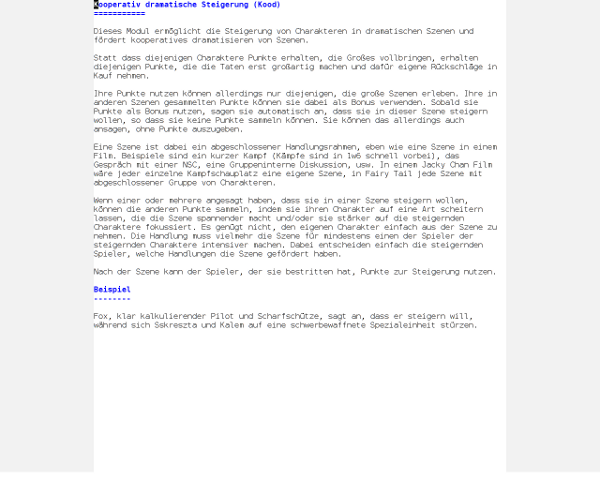free software
Richard M. Stallman stands for Free Software
Mi, 09/14/2011 - 05:58 — Draketo→ a comment to 10 Hackers Who Made History by Gizmodo.
As DDevine says, Richard Stallman is no proponent of Open Source, but of Free Software. Open Source was forked from the Free Software movement to the great displeasure of Stallman.
He really does not like the term Open Source, because that implies that it is only about being able to read the sources.
Different from that, Free Software is about the freedom to be in control of the programs one uses, and to change them.
More exactly it defines 4 Freedoms:
50€ for the Freenet Project - and against censorship
Mo, 09/12/2011 - 17:56 — DraketoAs I pledged1, I just donated to freenet 50€ of the money I got back because I cannot go to FilkCONtinental. Thanks go to Nemesis, a proud member of the “FiB: Filkers in Black” who will take my place at the Freusburg and fill these old walls with songs of stars and dreams - and happy laughter.
It’s a hard battle against censorship, and as I now had some money at hand, I decided to do my part (freenetproject.org/donate.html).
-
The pledge can be seen in identi.ca and in a Sone post in freenet (including a comment thread; needs a running freenet node (install freenet in a few clicks) and the Sone plugin). ↩
- Login to post comments
- Weiterlesen
pyRad is now in Gentoo portage! *happy*
Mo, 07/18/2011 - 08:12 — DraketoMy wheel type command interface pyRad just got included in the official Gentoo portage-tree!
So now you can install it in Gentoo with a simple emerge kde-misc/pyrad.
- Login to post comments
- Weiterlesen
(A)GPL as hack on a Python-powered copyright system
Sa, 06/11/2011 - 07:50 — DraketoAGPL is a hack on copyright, so it has to use copyright, else it would not compile/run.
All the GPL licenses are a hack on copyright. They insert a piece of legal code into copyright law to force it to turn around on itself.
You run that on the copyright system, and it gives you code which can’t be made unfree.
To be able to do that, it has to be written in copyright language (else it could not be interpreted).
my_code = "<your code>"
def AGPL ( code ):
"""
>>> is_free ( AGPL ( code ) )
True
"""
return eval (
transform_to_free ( code ) )
copyright ( AGPL ( my_code ) )
You pass “AGPL ( code )” to the copyright system, and it ensures the freedom of the code.
- Login to post comments
- Weiterlesen
Some technical advantages of the Hurd
So, 05/15/2011 - 11:51 — Draketo→ An answer to just accept it, truth hurds, where Flameeyes told his reasons for not liking the Hurd and asked for technical advantages (and claimed, that the Hurd does not offer a concept which got incorporated into other free software, contributing to other projects). Note: These are the points I see. Very likely there are more technical advantages which I don’t see well enough to explain them.
The translator system in the Hurd is a simple concept that makes many tasks easy, which are complex with Linux (like init, network transparency, new filesystems, …). Additionally there are capabilities (give programs only the access they need - adjusted at runtime), subhurds and (academic) memory management.
Information for potential testers: The Hurd is already usable, but it is not yet in production state. It progressed a lot during the recent years, though. Have a look at the status report if you want to see if it’s already interesting for you. See running the Hurd for testing it yourself.
Table of Contents:
- Influence on other systems: FUSE and BSD
- Advantages for users
- Advantages for administrators and developers
- Summary
Influence on other systems: FUSE in Linux and limited translators in NetBSD
Firstoff: FUSE is essentially an implementation of parts of the translator system (which is the main building block of the Hurd) to Linux, and NetBSD recently got a port of the translators system of the Hurd. That’s the main contribution to other projects that I see.
As an update in 2015: A pretty interesting development in the past few years is that the systemd developers have been bolting features onto Linux which the Hurd already provided 15 years ago. Examples: socket-activation provides on-demand startup like passive translators, but as crude hack piggybacked on dbus which can only be used by dbus-aware programs while passive translators can be used by any program which can access the filesystem, calling priviledged programs via systemd provides jailed priviledge escalation like adding capabilities at runtime, but as crude hack piggybacked on dbus and specialized services.
That means, there is a need for the features of the Hurd, but instead of just using the Hurd, where they are cleanly integrated, these features are bolted onto a system where they do not fit and suffer from bad performance due to requiring lots of unnecessary cruft to circumvent limitations of the base system. The clean solution would be to just set 2-3 full-time developers onto the task of resolving the last few blockers (mainly sound and USB) and then just using the Hurd.
translator-based filesystem
On the bare technical side, the translator-based filesystem stands out: The filesystem allows for making arbitrary programs responsible for displaying a given node (which can also be a directory tree) and to start these programs on demand. To make them persistent over reboots, you only need to add them to the filesystem node (for which you need the right to change that node). Also you can start translators on any node without having to change the node itself, but then they are not persistent and only affect your view of the filesystem without affecting other users. These translators are called active, and you don’t need write permissions on a node to add them.
Mercurial Workflow: Feature seperation via named branches
Di, 05/10/2011 - 15:44 — DraketoAlso published on Mercurials Workflows wikipage. Originally written for PyHurd: Python bindings for the GNU Hurd.
For Whom?
If you
- want to develop features collaboratively and you want to be able to see later for which feature a given change was added or
- want to do changes concurrently which would likely affect each other negatively while they are not finished, but which need to be developed in a group with minimal overhead,
then this workflow might be right for you.
Note: If you have a huge number of small features (2000 and upwards), the number of persistent named branches can create some performance problems for listing the branches (only for the listing!) (as different example, pushing is unaffected: Linear history is just as fast as 2000 branches). For features which need no collaboration or need only a few commits, this workflow also has much unnecessary overhead. It is best used for features which will be developed side by side with default for some time (and many commits), so tracking the default branch against the feature is relevant. To mark single-commit features as belonging to a feature, just use the commit message.
Note: The difference between Mercurial named branches and git branches is that git branches don’t stay in history. They don’t allow you to find out later in which branch a certain commit was added. If you want git-style branching, just use bookmarks.
Note: If you avoid using stable as branch name, you can always upgrade this workflow to the complete branching model later on.
- Login to post comments
- Weiterlesen
Infinite Hands draft with Bodhran and Flute
Do, 04/28/2011 - 11:31 — DraketoA rough draft of Infinite Hands with additional instruments.
The Flute and Bodhran tracks are improvised on the spot and recorded yesterday in one go, so they are a bit rough :)
Also the vocals are finally up to date with the text.
I hope you enjoy it!
→ download ←
For more Information on the song, see infinite-hands.draketo.de.
- Login to post comments
- Weiterlesen
A GNU Head, redrawn
Di, 04/26/2011 - 22:15 — DraketoFor my new Neo-Keyboard I wanted the GNU head from GNU and the plussy from FSFE on the meta/super keys (those which often have a Fenster-Logo). Sadly the normal GNU head did not work very well with the Laser from Schubi, so I grabbed my tablet, fired up mypaint and created a new one, building on the old, but adding more contrast and stronger lines. I hope you like it!

- Login to post comments
- Weiterlesen
Learning Mercurial in Workflows
Do, 03/17/2011 - 09:42 — DraketoThe official workflow guide for Mercurial, mirrored from mercurial-scm.org/guide. License: GPLv2 or later.
It delves into nonlinear history and merging right from the beginning and uses only features you get without activating extensions. Due to this it offers efficient and safe workflows without danger of losing already committed work.
- Login to post comments
- Weiterlesen
Infocalypse - Make your code survive the information apocalypse
Di, 03/15/2011 - 11:21 — DraketoAnonymous DVCS in the Darknet.
Update 2024: Infocalypse is still recovering from Python 3 breakage. Most of it works again, but there may be rough edges left. Contributions to fix these are very welcome: hg.sr.ht/~arnebab/infocalypse or github.com/hyphanet/infocalypse.
This is a mirror of the documentation of the infocalypse extension for Mercurial written by djk - published here with his permission. It is licensed solely under the GPLv2 or later. The text is long. For concise information, use the second Link above (Freenet Development over Freenet).
Introduction
The Infocalypse 2.0 hg extension is an extension for Mercurial that allows you to create, publish and maintain incrementally updateable repositories in Freenet.
Your code is then hosted decentrally and anonymously, making it just as censorship-resistant as all other content in Freenet.
It works better than the other DVCS currently available for Freenet.
Most of the information you will find in this document can also be found in the extension's online help. i.e.:
hg help infocalypse
- Login to post comments
- Weiterlesen
Simple Emacs DarkRoom
Sa, 01/22/2011 - 03:19 — DraketoI just realized that I let myself be distracted by all kinds of not-so-useful stuff instead of finally getting to type the text I already wanted to transcribe from stenografic at the beginning of … last week.
Screenshot!
Let’s take a break for a screenshot of the final version, because that’s what we really want to gain from this article: a distraction-free screenshot as distraction from the text :)
As you can see, the distractions are removed — the screenshot is completely full screen and only the text is left. If you switch to the minibuffer (i.e. via M-x), the status bar (modeline) is shown.
A vision for a social Freenet with WoT, FreeTalk and Sone
Di, 01/04/2011 - 09:02 — DraketoI let my thought wander a bit around the question how a social Freenet (2.0 ;) ) could look from the view of a newcomer.
I imagine myself installing freenet. The first thing to come up after starting it is the node page. (italic Text in brackets is a comment. The links need a Freenet running on 127.0.0.1 to work)
“Welcome to Freenet, where no one can tell you’re reading”
“Freenet tries hard to project your privacy. Therefore we created a pseudonymous ID for you. Its name is Gandi Schmidt.
- Login to post comments
- Weiterlesen
Freenet: WoT, database error, recovery patch
Mo, 11/22/2010 - 19:06 — DraketoI just had a database error in WoT (the Freenet generic Web of Trust plugin) and couldn’t access one of my identities anymore (plus I didn’t have a backup of its private keys though it told me to keep backups – talk about carelessness :) ).
I asked p0s on IRC and he helped me patch together a WoT which doesn’t access the context for editing the ID (and in turn misses some functionality). This allowed me to regain my IDs private key and with that redownload my ID from freenet.
- Login to post comments
- Weiterlesen
turn files with wikipedia syntax to html (simple python script using mediawiki api)
Fr, 10/29/2010 - 20:19 — DraketoI needed to convert a huge batch of mediawiki-files to html (had a 2010-03 copy of the now dead limewire wiki lying around). With a tip from RoanKattouw in #mediawiki@freenode.net I created a simple python script to convert arbitrary files from mediawiki syntax to html.
Usage:
- Download the script and install the dependencies (yaml and python 3).
- Login to post comments
- Weiterlesen
I hope French Filesharers turn to Freenet
Di, 09/21/2010 - 22:37 — Draketo→ Comment to France Starts Reporting ‘Millions’ of File-Sharers by Torrent Freak.
I hope they all turn to freenet. There’s scance chance of getting many user-addresses there, and it can provide a service similar to torrents and decentral tracker in one, but anonymously and safe from censorship.
I’ve been running it for years now, and it got better and more secure every year.
- Login to post comments
- Weiterlesen
The Four Freedoms of Free Culture: Avoid Cultural Slavery
Mi, 09/01/2010 - 07:24 — Draketo→ comment to The Four Freedoms of Free Culture on QuestionCopyright.org.
Thank you for spreading the thought of freedom in culture!
I currently don’t use creativecommons licenses on my site, because they have no source protection (you can’t exercise your right of modifying, if the work is hidden inside some non-source container, like autoscrolling flash).
Update: I changed this in 2015 when cc by-sa became one-way compatible with GPLv3. Now I also allow cc by-sa for text.
Instead I use the GPLv3, for my site (draketo.de — licensing) as well as for a free roleplaying book I write (1w6.org — german).
My reason for using free licenses in all my hobby work is simple: When a cultural work becomes part of my life, any restriction on using that work takes away a part of my personal freedom.
That’s why freedom is essential for all cultural works that matter.
- Login to post comments
- Weiterlesen
Screencast: Tabbing of everything in KDE
Di, 08/31/2010 - 07:48 — DraketoI just discovered tabbing of everything in KDE:
(download)
Created with recordmydesktop, cut with kdenlive, encoded to ogg theora with ffmpeg2theora (encoding command).
Music: Beat into Submission on [Public Domain](
Freenet
So, 08/15/2010 - 08:46 — DraketoWhen free speech dies, we need a place to organize.
Freenet is a censorship resistant, distributed p2p-publishing platform.
*Too technical? Let’s improve that: Freenet is the internet's last, best hope for Freedom.
- Login to post comments
- Weiterlesen
writing together – collaborative editing is easy
Sa, 08/07/2010 - 13:56 — Draketo→ comment to The next wave in scholarly word processors?
What I’d like to see is more people using version tracking systems.
With these you have a discussion which can be merged easily when it gets branched. I use it for anything I do, and I could use it together with an only-windows-and-GUI user with ease, installing TortoiseHG for both and Lyx for him (LaTeX made easy – you don’t have to see the sources).
- Login to post comments
- Weiterlesen
Weltenwald-theme under AGPL (Drupal)
Do, 08/05/2010 - 06:32 — DraketoAfter the last round of polishing, I decided to publish my theme under AGPLv3. Reason: If you use AGPL code and people access it over a network, you have to offer them the code. Which I hereby do ;)
That’s the only way to make sure that website code stays free.
It’s still for Drupal 5, because I didn’t get around to port it, and it has some ugly hacks, but it should be fully functional.
Just untar it in any Drupal 5 install.
- Login to post comments
- Weiterlesen
pyRad - a wheel type command interface for KDE
Do, 07/15/2010 - 20:45 — DraketoArrrrrr! Ye be replacin' th' walk th' plank alt-tab wi' th' keelhaulin' pirate wheel, matey! — Lacrocivious
pyRad is a wheel type command interface for KDE1, designed to appear below your mouse pointer at a gesture.
install | setup | usage and screenshots | download and sources

- Login to post comments
- Weiterlesen
No, it ain’t “forever” (GNU Hurd code_swarm from 1991 to 2010)
Di, 07/13/2010 - 15:05 — DraketoIf the video doesn’t show, you can also download it as Ogg Theora & Vorbis “.ogv” or find it on youtube.
- Login to post comments
- Weiterlesen
pkgcore vs. eix → pix (find packages in Gentoo)
Fr, 06/25/2010 - 22:18 — DraketoFor a long time it bugged me, that eix uses a seperate database which I need to keep up to date. But no longer: With pkgcore as fast as it is today, I set up pquery to replace eix.
The result is pix:
alias pix='pquery --raw -nv --attr=keywords'
(put the above in your ~/.bashrc)
The output looks like this:
$ pix pkgcore
* sys-apps/pkgcore
versions: 0.5.11.6 0.5.11.7
installed: 0.5.11.7
repo: gentoo
description: pkgcore package manager
homepage: http://www.pkgcore.org
keywords: ~alpha ~amd64 ~arm ~hppa ~ia64 ~ppc ~ppc64 ~s390 ~sh ~sparc ~x86
- Login to post comments
- Weiterlesen
A song from the icy lands
Fr, 06/25/2010 - 10:35 — DraketoA song about sharing and free software and changing the world. Originally written to recreate the vision of the Polar Skulk in art.
Criticism and praise would be a great gift to the pup writing this song.
A song from the icy lands
Freedom for Music, for Movies and for every word,
Fighting is not quite absurd,
and we are peaceful, good and kind,
and fight for freedom of the mind.
- Login to post comments
- Weiterlesen
How to make a million dollars in pay-what-you-want — thoughts on the Humble Indie Bundle
Mi, 05/19/2010 - 06:36 — DraketoSome thoughts1 on how the humble Indie Bundle managed to get more than 1.25 Million Dollars2 in one and a half weeks — more than one quarter of that from GNU/Linux users.
-
Originally written as comment to Why Games don't get ported to Linux...A game dev speaks. ↩
-
Stats directly from the Website of the Humble Indie Bundle. ↩
- Login to post comments
- Weiterlesen
Internet, community cloud foo and control of my own data
Di, 03/30/2010 - 03:55 — DraketoWhy?
What I miss in the internet is the notion of being able to control what my apps access for data.
Why can’t a chat application just connect to a neighborhood- or community-server, and why can’t the activity-stream come from the people I know — and query only their systems, like jabber does?
Almost all geolocation services should be implementable over direct friend-to-friend connections like jabber, and I don’t really see why my local identi.ca program can’t also get the news from my local jabber contacts.
- Login to post comments
- Weiterlesen
Ogg Theora and h.264 - which video codec as standard for internet-video?
So, 03/21/2010 - 21:49 — Draketo- Video encoder comparison - a much more thorough comparision than mine
We had a kinda long discussion on identi.ca about Ogg Theora and h.264, and since we lacked a simple comparision method, I hacked up a quick script to test them.
It uses frames from Big Buck Bunny and outputs the files bbb.ogg and bbb.264 (license: cc by).
- Login to post comments
- Weiterlesen
deletion attempt against the dwm article on wikipedia (comment)
Fr, 03/19/2010 - 08:57 — Draketo-> a comment to
Wikipedia, Notability, and Open Source Software by ubunTARD.
2010-03-23
Update: I just got unblocked by henrik who also sent me an excuse for the way the whole process was handled: “…The block was partly an individual misjudgment, but also a result of the systemic culture and some poorly thought out policies. If you're interested, I'd be happy to discuss it in more detail…”. And that restores a lot of my faith in the wikipedia community — thank you very much for your excuse, henrik!
Also they are currently discussing on the incidents board how to avoid similarly overboarding blocking like that in the future.
Just as an inside notice from the discussion: I joined the first deletion discussion when I got note of it (I don't know anymore through which channel) and when it got closed, I joined the second one and got heavily frustrated when people tried to turn “he sent the developers a berliner bratwurst” into “the magazine which published his article is a first source” (which would mean it wouldn't count as source for “notability”).
- Login to post comments
- Weiterlesen
Defective by Design is doing something important - actions like theirs got me to GNU/Linux
Sa, 01/30/2010 - 10:24 — Draketo-> A reply to bashing against Defective By Design.
I was a rabid MacUser 5 years ago.
Then I learned about DRM, TPM and privacy. And I left Apple because they put in TPM chips into developer machines.
Today I'm a happy GNU/Linux user and I contribute from time to time to Gentoo, KDE and Mercurial.
(my way from Apple to GNU/Linux:
- http://bah.draketo.de/ (Broken Apple Heart in German)
- http://draketo.de/english/songs/light/broken-apple-heart (in english)
)
- Login to post comments
- Weiterlesen
identi.ca Group: Out of Group (!oog)
Di, 01/19/2010 - 22:41 — DraketoWhat !oog is
The Out of Group group is a way to request leading an overboarding discussion out of group (so you don't spam all the people who are in the group where the discussion started, but who simply want news).
Motto
Please discuss out of group. You can wrap up the discussion afterwards (link to the context) and add a group tag then.
How To
- Login to post comments
- Weiterlesen



